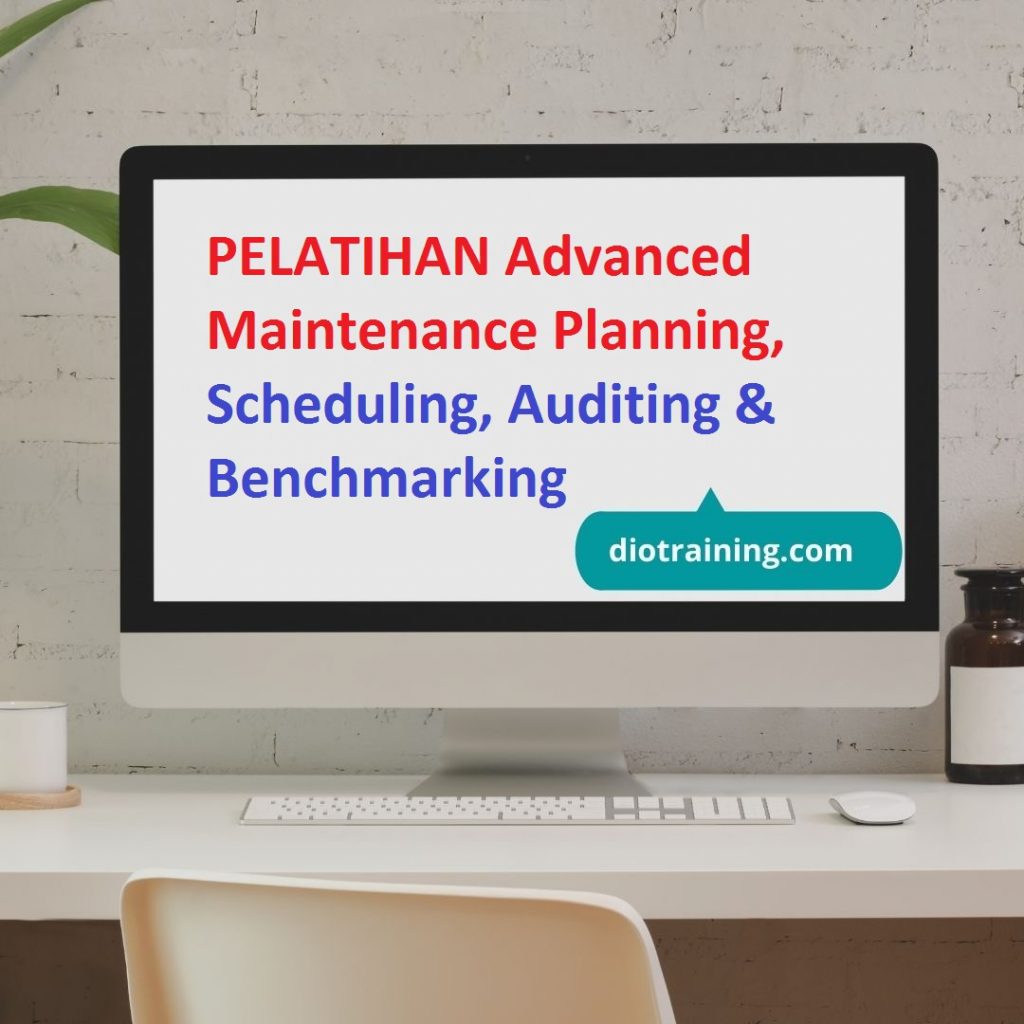PELATIHAN Advanced Maintenance Planning, Scheduling, Auditing & Benchmarking Advanced Maintenance Planning, Scheduling, Auditing & Benchmarking
 DESKRIPSI PELATIHAN Advanced Maintenance Planning, Scheduling, Auditing & Benchmarking
DESKRIPSI PELATIHAN Advanced Maintenance Planning, Scheduling, Auditing & Benchmarking
The maintenance of physical assets can no longer be treated as an ‘engineering problem’. The competitive environment in which business operates requires an approach that integrates the operational objectives of the business and the life-cycle objectives of the physical assets. Leading industrial organizations are evolving away from reactive (“fix-it-when-it-breaks”) management into predictive, productive management (“anticipating, planning, and fix-it-before-it-breaks”). This evolution requires well-planned and executed actions on several fronts.
Organisations increasingly need to make improvement a key part of theirculture in order to remain cost competitive. The same is true of Maintenance Organisations. Maintenance Departments are increasingly under pressure to improve performance and reduce costs.This program looks at Maintenance Auditing and Benchmarking as two key tools that can be used as the basis for driving the improvement process in maintenance, by identifying best practices, gaps with current practices and assist with the formulation of strategies to bridge such gaps.In addition, we address how Auditing and Benchmarking can become an integral part of a maintenance management strategy by integrating such activities into maintenance performance measures, key performance indicators and objective setting.
MATERI PELATIHAN Advanced Maintenance Planning, Scheduling, Auditing & Benchmarking
Modern Maintenance Management Practice in Perspective
* Maintenance Practice in Perspective
1. Maintenance in the Business Process
2. Evolution in Maintenance Management
3. The Contribution of Maintenance to the achievement of the Business Objectives
4. Business, Operations and Maintenance Key Performance Area
5. The Maintenance Objective
6. Roles and Accountability
2. Maintenance Policies and Logistics Planning
* Equipment Classification and Identification
1. Functional Location
2. Equipment Type Classification
3. Equipment Identification
4. Part Number and Bill of Material
5. Documentation Structures
6. Document Identification and Classification
* Maintenance Management Policies
1. Equipment Criticality Grading
2. JOB Record Policy
3. JOB Information Requirements
4. Principles of Work Order Design
5. Maintenance Work Prioritisation
* Maintenance Logistics Planning
1. Logistic Support Analysis
2. Maintenance Task Detail Planning
3. Maintenance Work Estimating
4. Maintenance Levels
5. Support Documentation
6. Support Equipment
7. Personnel and Organisation
3. Failure Management Programme Development
* Failure Modes, Effects and Consequences
1. Equipment Functions and Performance Standards
2. Functional Failures
3. Failure Modes
4. Failure Effects
5. Consequences of Failure
* Failure Management Policies
1. Age Related Failure Patterns
2. Random Failure Patterns
3. Routine Restoration and Discard Task
4. Routine Condition-based Tasks
5. Failure-finding Tasks
6. The application of RCM in the Development of Failure Management Policies
* Implementing Failure Management Policies
1. Proposed Routine Maintenance Tasks
2. Categorising and structuring Routine Maintenance Tasks
3. Corrective Maintenance Planning
4. Logistic Requirements Planning
4. Work Planning, Scheduling and Control
* Definition of Notifications, Defects, Deviations
* Notification Process, Roles and Principles
* Prioritising Notifications
* Weekly Master Schedule
* Master Schedule Objectives
* Categorise the Outstanding Workload
* Determine Resource Availability
* Determine Equipment Non-utilisationProfile
* Develop Draft Master Schedule
* Conduct Master Schedule Review Meeting
* Final Master Schedule and Implementation
* Backlog Management
5. Introduction and Foundation Concepts
* Introduction to Auditing and Benchmarking
* Introduction to Maintenance Processes
* Approaches to Maintenance Management and Improvement
* Introduction to Maintenance Management Benchmarking Frameworks
6. Maintenance Auditing
* Maintenance Performance Measures and Metrics
* The Maintenance Auditing Process
* Maintenance Auditing Methodology
* Conducting a Maintenance Audit
* Maintenance Audit Simulation Case Study
7. Maintenance Auditing and Benchmarking
* Maintenance Audit Simulation Case Study
* Using Maintenance Audit Results to Plan Improvement Strategies
* Introduction to Benchmarking
* The Maintenance Benchmarking Process
* Maintenance Benchmarking Methodology
* Benchmarking Tools and Techniques
8. Maintenance Benchmarking and Performance Measurement
* Benchmarking Tools and Techniques (continued)
* Designing and Preparing for a Benchmarking Study
* Selecting Benchmarking Partners
* Preparing for an conducting the benchmarking visit
* Reporting results of Benchmarking and Auditing Studies
* The DMG Analysis Advanced Benchmarking Conducting a Maintenance Benchmarking Study
9. Auditing, Benchmarking and Maintenance Improvement
* Benchmarking Simulation Case Study
* Integrating Benchmarking resulting into improvement and objective setting processes
* Integrating Maintenance Auditing and Benchmarking into the Performance Measurement System to establish improvement objectives and strategies
* Review of Best Practice Benchmarks and Case Studies
* Conclusion
INSTRUKTUR TRAINING
Pelatihan ini akan dibawakan oleh trainer/ pemateri yang berpengalaman di bidangnya.
METODE TRAINING
1. Presentation
2. Discuss
3. Case Study
4. Evaluation
5. Pre-Test & Post-Test
6. Games
Jadwal Diorama Training Tahun 2025
- Januari : 16-17 Januari 2025
- Februari : 13-14 Februari 2025
- Maret : 5-6 Maret 2025
- April : 24-25 April 2025
- Mei : 21-22 Mei 2025
- Juni : 11-12 Juni 2025
- Juli : 16-17 Juli 2025
- Agustus : 20-21 Agustus 2025
- September : 17-18 September 2025
- Oktober : 8-9 Oktober 2025
- November : 12-13 November 2025
- Desember : 17-18 Desember 2025
Catatan: Jadwal tersebut dapat disesuaikan dengan kebutuhan calon peserta. Peserta dapat mengajukan tanggal pelaksanaan pelatihan. Sebelum melakukan booking tiket perjalanan maupun hotel mohon untuk menghubungi marketing kami terlebih dahulu. Kesalahan pemesanan tiket terkait jadwal tanpa surat konfirmasi (Confirmation Letter) bukan merupakan tanggung jawab tim Diorama Training.
LOKASI
REGULER TRAINING
- Yogyakarta, Hotel Fortuna Grande Malioboro (6.000.000 IDR / participant)
- Jakarta, Hotel Amaris Kemang La Codefin (6.500.000 IDR / participant)
- Bandung, Hotel Neo Dipatiukur (6.500.000 IDR / participant)
- Bali, Hotel Ibis Kuta (7.500.000 IDR / participant)
- Lombok, Hotel Jayakarta (7.500.000 IDR / participant)
- Surabaya, Hotel Neo Gubeng (7.500.000 IDR / participant)
ONLINE TRAINING VIA ZOOM
INVESTASI
- Investasi pelatihan selama tiga hari tersebut menyesuaikan dengan jumlah peserta (on call). *Please feel free to contact us.
Catatan: Apabila perusahaan membutuhkan paket in house training, anggaran investasi pelatihan dapat menyesuaikan dengan anggaran perusahaan.
Benefit Apa Saja yang Didapatkan Peserta?
- FREE Airport pickup service (Gratis Antar jemput Hotel/Bandara)
- FREE Transportasi Peserta ke tempat pelatihan (By Request)
- Module / Handout
- FREE Flashdisk
- Sertifikat
- FREE Bag or backpack (Tas Training)
- Training Kit (Dokumentasi photo, Blocknote, ATK, etc)
- 2x Coffee Break & 1 Lunch, Dinner
- FREE Souvenir Exclusive
FAQ tentang Diotraining
P : Berapa minimal running pelatihan ini ?
J : Pelatihan ini akan running idealnya minimal dengan 3 peserta, tetapi bisa disesuaikan dengan kebutuhan peserta
P : Apakah bisa jika saya hanya ingin pelatihan sendiri aja / private course ?
J : Bisa, kami akan membantu menyelenggarakan pelatihan 1 hari jika ada persetujuan dari klien
P : Dimana saja pelatihan biasanya di selenggarakan?
J : Pelatihan kami selenggarakan di beberapa kota besar di Indonesia seperti Bandung, Jakarta, Yogyakarta, Surabaya, Malang, Bali, Lombok dan beberapa negara seperti Singapore dan Malaysia
P : Apakah bisa diselenggarakan selain di kota lain?
J : Penyelenggaraan pelatihan bisa diadakan di kota lain dengan minimal kuota 5 orang setiap kelas
P : Apakah bisa juga diselenggarakan secara IHT/ In House Training di Perusahaan klien ?
J : Bisa diselenggarakan secara IHT di Perusahaan klien
P : Apakah jadwal bisa disesuaikan dengan kebutuhan klien ?
J : Jadwal pelatihan dapat di sesuaikan dengan kebutuhan klien.
Materi, Lokasi dan Jadwal Pelatihan Bisa Berubah Sewaktu-waktu dan disesuaikan Dengan Kondisi Peserta, dimohon untuk Melakukan Konfirmasi untuk Segala Bentuk Perubahan, agar Tidak Terjadi Miskomunikasi. Segera Daftarkan Pelatihan, Dapatkan Promo Menarik Bulan Ini.
Beberapa Klien Kami
Silabus Training ini di edit oleh Wafa Setiawan sebagai Content Writer Spesialis. Tim Diorama Training di bidang Pelatihan Konsultasi Sumbedaya Manusia dan Sertifikasi.









